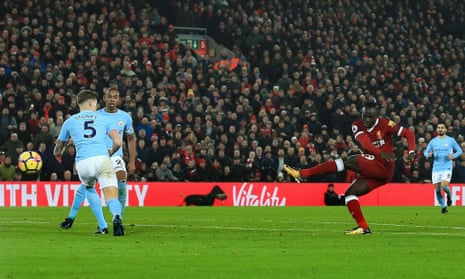It turns out, then, that the formula was simple. All anybody had to do to beat Manchester City was to match them shape for shape, press high up the pitch, harass them into a eight-minute meltdown, capitalise on mistakes with a series of stunning finishes and then cling on desperately.
Jürgen Klopp is not the first manager to realise that the best way to unsettle a Pep Guardiola side is to squeeze them, and this is not the first time he has had his side do that effectively. No manager has a better record than Klopp against Guardiola: six wins in 12 attempts. But, as Tottenham discovered, trying to push high against City is fraught with risk; they did it well enough to force City to adapt their approach and ended up being hammered 4-1.
To sit deep and look to endure may be the best course of action for less talented or more cautious sides but, as Klopp said, to do so is looking to “win the lottery”. It is letting City dictate terms, trying to reduce the number of chances they create and then hoping for the best. The moment of brilliance that undoes even the best-drilled of defences may, with City, always be a second or two away. So Klopp, as he always does, pressed.
In Germany, Guardiola reacted to the way his Bayern were rattled by Klopp’s Borussia Dortmund by beginning one game against them with Javi Martínez up front alongside Mario Mandzukic and hitting long balls at them to bypass the press. Short of playing Eliaquim Mangala as an improbable target man there is no such option for him in this City squad, and that renders them vulnerable. Champions League opponents will have taken note.
But just how well Liverpool played should not be neglected. Their pressing was not merely ferocious it was also disciplined – “from another planet”, Klopp said. The buildup to Liverpool’s third goal, scored almost straight from the kick-off after their second, exemplified the pattern perfectly. Roberto Firmino hovered in the space between the central defenders and Fernandinho, Mohamed Salah waited, ready to step in to cut out a potential pass out to Danilo, while Sadio Mané did the same on the other flank to prevent John Stones playing it right to Kyle Walker.
When Stones hesitated, Firmino approached, forcing a nervy short pass to Nicolás Otamendi. That was the trigger. Salah closed in, Mané advanced and Alex Oxlade-Chamberlain surged past Fernandinho. Otamendi, under pressure, had nowhere to go, lost possession and Mané thrashed a shot into the top corner. It sounds simple but, as Klopp said, if it were that easy everybody would do it. It required all four players to recognise the trigger and pounce as one. It’s not headless-chicken charging after the ball; it’s a coordinated action no less based on positioning and cohesion than a fluent passing move.
It helped, of course, that City panicked. Stones has improved this season but since he returned from injury he has begun making mistakes again. Between the 60th and 68th minutes Liverpool not only scored three times but also hit the post. Guardiola was broadly relaxed after the game, as somebody whose side has a double-digit lead should be, but he acknowledged such a collective loss of control is a problem.
Not that City are unique in that. The modern trend, perhaps heightened by the widespread preference for playing the ball out from the back and prioritising passing ability in defenders over more old-fashioned virtues such as marking and tackling, is for sudden collapses, even for top sides. That’s why, in the past eight seasons, 21 games at the quarter-final stage or later of the Champions League (including Guardiola’s Bayern against both Real Madrid and Barcelona) have been won by a three-goal margin; in the eight seasons before that there were only eight. This match would have been one of those had Liverpool not suffered their own mini-collapse at the end.
It’s also why this game began with an apparent paradox – Liverpool had the best home defensive record and City the best away defensive record in the league, conceding four and five in 11 games respectively, and yet the expectation was for the goalfest that ensued. For both sides a basic truth remains: it is very hard to get at them, but if you can there is a soft centre to be exposed.
Yet it is a measure of how good City are that Liverpool’s pressing was exemplary and yet they still only just won.

